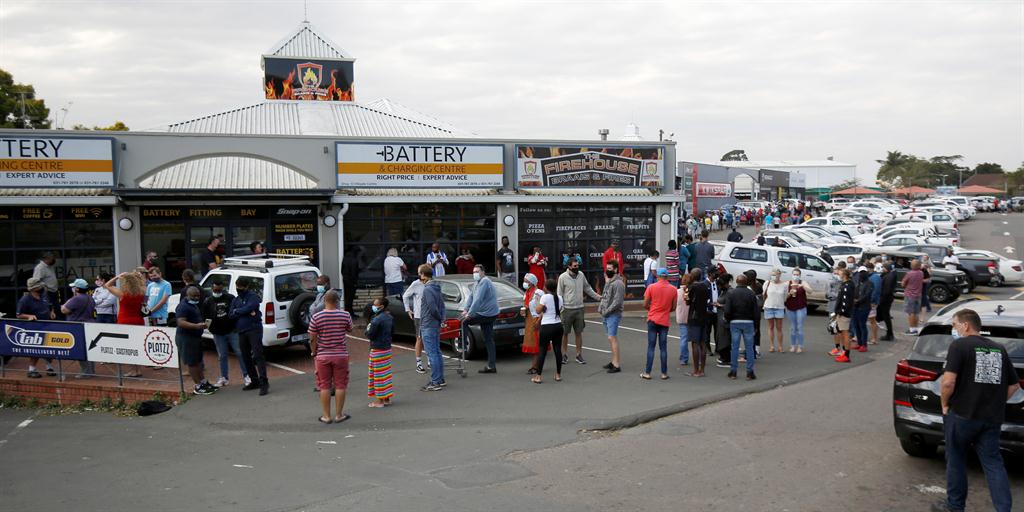South Africa plans billions in relief
The largest component of the relief package is the reinstatement of a R350 -a-month social relief grant until the end of March 2022.
ALEXANDER WINNING AND WENDELL ROELF
South Africa plans about R36 billion of relief measures to support businesses and individuals affected by unrest this month and by Covid-19 restrictions, the finance ministry said on Wednesday.
The interventions would be funded by better government revenues and by shifting around some spending, senior officials told a news conference, expanding on measures announced by President Cyril Ramaphosa on Sunday.
The government tightened lockdown restrictions at the end of June as coronavirus cases spiked, but they have since been eased. An economic recovery drive was dealt a big blow by arson and looting triggered by the jailing of former President Jacob Zuma this month.
"We are funding this package within available resources currently. We are not going to be going for borrowing," National Treasury Director-General Dondo Mogajane said.
Edgar Sishi, acting head of the budget office, said increased revenue linked to higher commodity prices meant R36.2 billion of new spending could be accommodated "so long as those measures are temporary".
The largest component of the relief package is the reinstatement of a R350 -a-month social relief grant until the end of March 2022, which will cost R26.7 billion, an annexure released later by the National Treasury showed.
Claims
State insurer Sasria will get R3.9 billion to help pay out claims related to the unrest, R2.3 billion will be spent on helping businesses not covered for civil unrest, and a tax incentive will be expanded by R5 billion to encourage employers to hire and retain staff. More than R2.6 billion of spending will be reprioritised.
Finance Minister Tito Mboweni said one estimate of the damage during the riots was R50 billion. He said an extra R250 million would be allocated to the police and R700 million to the military, and that Sasria which covers against risks including civil unrest would start paying out claims immediately.
The Unemployment Insurance Fund has set aside R5.3 billion in new support, he added. Mogajane said he had reassured investors that the country's economic fundamentals were intact and reforms were happening.
Sporadic protests erupted in Zuma's home province after his imprisonment for contempt of court and then escalated, with violence fuelled by the poverty and inequality that persist almost three decades after the end of apartheid. -Nampa/Reuters
South Africa plans about R36 billion of relief measures to support businesses and individuals affected by unrest this month and by Covid-19 restrictions, the finance ministry said on Wednesday.
The interventions would be funded by better government revenues and by shifting around some spending, senior officials told a news conference, expanding on measures announced by President Cyril Ramaphosa on Sunday.
The government tightened lockdown restrictions at the end of June as coronavirus cases spiked, but they have since been eased. An economic recovery drive was dealt a big blow by arson and looting triggered by the jailing of former President Jacob Zuma this month.
"We are funding this package within available resources currently. We are not going to be going for borrowing," National Treasury Director-General Dondo Mogajane said.
Edgar Sishi, acting head of the budget office, said increased revenue linked to higher commodity prices meant R36.2 billion of new spending could be accommodated "so long as those measures are temporary".
The largest component of the relief package is the reinstatement of a R350 -a-month social relief grant until the end of March 2022, which will cost R26.7 billion, an annexure released later by the National Treasury showed.
Claims
State insurer Sasria will get R3.9 billion to help pay out claims related to the unrest, R2.3 billion will be spent on helping businesses not covered for civil unrest, and a tax incentive will be expanded by R5 billion to encourage employers to hire and retain staff. More than R2.6 billion of spending will be reprioritised.
Finance Minister Tito Mboweni said one estimate of the damage during the riots was R50 billion. He said an extra R250 million would be allocated to the police and R700 million to the military, and that Sasria which covers against risks including civil unrest would start paying out claims immediately.
The Unemployment Insurance Fund has set aside R5.3 billion in new support, he added. Mogajane said he had reassured investors that the country's economic fundamentals were intact and reforms were happening.
Sporadic protests erupted in Zuma's home province after his imprisonment for contempt of court and then escalated, with violence fuelled by the poverty and inequality that persist almost three decades after the end of apartheid. -Nampa/Reuters





Comments
Namibian Sun
No comments have been left on this article